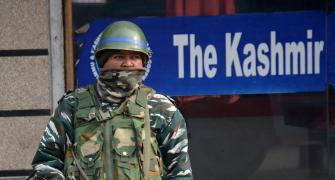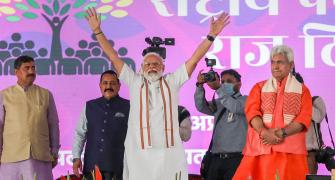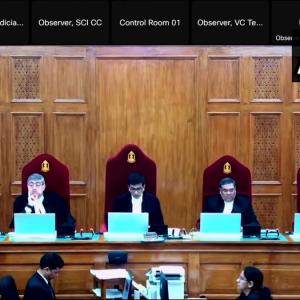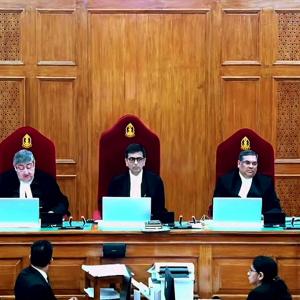Article 370 of the Constitution, which bestowed special status on the erstwhile state of Jammu and Kashmir, was a 'temporary provision' and any interpretation of the provision cannot postulate that integration of J-K with India was temporary, the Supreme Court ruled on Monday.

Upholding the abrogation of the controversial provision, the apex court said Article 370 read together with Article 1 of the Constitution leaves no manner of doubt that the integration of J-K as a part of the nation, which in itself was a Union of states, was complete.
"It can be garnered from the historical context for the inclusion of Article 370 and the placement of Article 370 in Part XXI of the Constitution that it is a temporary provision," Chief Justice of India D Y Chandrachud, writing for himself and justices B R Gavai and Surya Kant, said in his 352-page verdict.
In its landmark verdict, the five-judge constitution bench headed by CJI Chandrachud unanimously upheld the Centre's August 5, 2019 decision to abrogate provisions of Article 370, while directing restoration of statehood for J&K at the earliest and holding the assembly elections by September 30, 2024.
The apex court dealt with the question - whether the provisions of Article 370 were temporary in nature or they acquired a permanent status in the Constitution at the end of the J&K Constituent Assembly's tenure in 1957.
In his verdict, Justice Chandrachud said Article 370 was introduced to serve two purposes.
"First, an interim arrangement until the Constituent Assembly of the state was formed and could take a decision on the legislative competence of the Union on matters other than the ones stipulated in the IoA (Instrument of Accession), and ratify the Constitution (the transitional purpose);
"And second, an interim arrangement because of the special circumstances in the state because of the war conditions of the State (the temporary purpose)," he noted.
The CJI said there are intrinsic reasons in Article 370 that support the view that the provision was not intended by the framers to be a permanent feature of the Constitution at the date of the adoption of the Constitution.
"Part XXI of which Article 370 is a part specifies temporary and transitional provisions. In certain cases, the temporary provisions contained in Part XXI had a restriction with reference to the time over which they would operate," he said.
He said Article 370 was couched amidst other temporary and transitional provisions with a marginal note which indicates that its provisions were temporary.
"On January 26, 1950, when the Constitution was adopted, the state of Jammu and Kashmir became an integral part of the territory of India. The mandate of Article 1 is that 'India that is Bharat shall be a Union of States'," the CJI noted.
"Any interpretation of Article 370 cannot postulate that the integration of Jammu and Kashmir with India was temporary," he said.
In his separate verdict, Justice Sanjay Kishan Kaul said Article 370 contemplated the mechanism for extending the Parliament's law-making power and the various provisions of the Constitution of India to the state, which showed that Article 370 was meant to gradually bring the state on par with other states in this process of phased integration.
'A combination of factors, such as Article 370's historical context, its text, and its subsequent practice, indicate that Article 370 was intended to be a temporary provision,' he said in his 121-page concurring judgement.
He noted that the Instruments of Accession signed by the various erstwhile princely states were to be reflected in the Constitution of India itself.
"However, insofar as Jammu and Kashmir state was concerned, Article 370 was a special procedure contemplated due to the 'special conditions' in the state and hope was expressed that in times to come, 'Jammu & Kashmir will become ripe for the same sort of integration as had taken place in the other States'," Justice Kaul said.
"Thus, the intent was clear: of complete integration but taking place over a period of time. Article 370 was envisaged as an interim system till the State's Constituent Assembly came into being and for a limited period, on account of the special circumstances of the state," he said.
Justice Kaul said the provision was placed in Part XXI, which was titled 'Temporary and Transitional Provisions' at the time.
The marginal note to the provision was titled 'Temporary Provisions with respect to the State of Jammu and Kashmir', he noted.
In his separate verdict, Justice Khanna said the judgment penned by the CJI was scholarly and it elaborately annotates the complex legal issues.
He said the judgment authored by Justice Kaul pragmatically demystifies the factual and legal position.
"Both judgments are in seriatim and uniformly agree that Article 370 of the Constitution of India was a feature of asymmetric federalism and not sovereignty. Article 370 was enacted as a transitional provision and did not have permanent character," Justice Khanna said.
The petitions challenging the abrogation of the provisions of Article 370 and the validity of the Jammu and Kashmir Reorganisation Act, 2019 that divided the erstwhile state into the Union territories of Jammu and Kashmir and Ladakh were referred to the Constitution bench in 2019.










